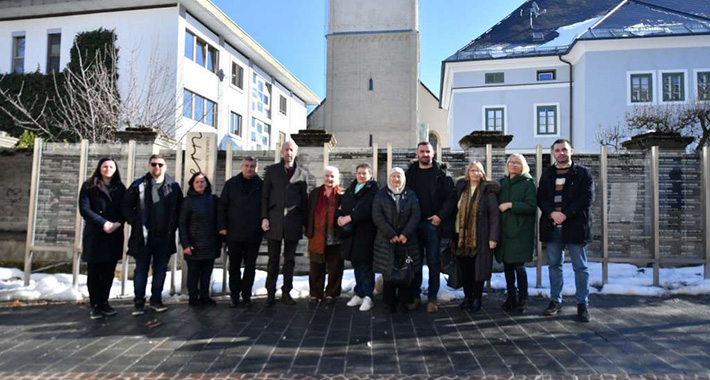Source: Fena.ba
The dialogue committee of the Srebrenica Memorial Center visited the memorial dedicated to the victims of the Holocaust and all victims of the Nazi regime in the German city of Dachau.
The visit was realized as part of the "Truth, Dialogue, Future" project, which is implemented by the Srebrenica Memorial Center with the support of the Government of the United Kingdom.
According to estimates, more than 40,000 people from all over Europe were killed in the Dachau camp, and close to 200,000 were imprisoned. This infamous concentration camp was the first of its kind on the soil of Nazi Germany at the time. The memorial, located on the site of the former camp, depicts the suffering of the detainees and all the brutality of the Nazi regime.
- In the previous days, we visited places where thousands of people were killed just because they were of different faiths, different beliefs and different races. The Nazis imprisoned, tortured and killed over 40 thousand men, women and children in the Dachau camp. In a conversation with representatives of the Jewish community in Munich, we learned that out of the six million Jews killed, one million children perished in the Holocaust. That's a million souls who didn't get a chance to live. We will not and must not forget that. As we remember our murdered children, it is our duty to remember other people's children, who were brutally murdered. Crime does not become obsolete, neither the victim nor the criminal must ever be forgotten. We remember the victim so that she will continue to live in our hearts, and the criminal so that we constantly remind the young generation that they must recognize criminal ideologies in order to prevent them - said the mothers of Srebrenica and Bratunac.
During the visit, the Dialogue Committee paid tribute to the victims of the Holocaust in the Austrian town of Villach at the "Denkmal der Namen" ("Memorial of the Name") monument, after which they visited the Jewish Municipality of the City of Munich and the Ohel Jakob Synagogue. On that occasion, they met with the director of the Jewish community, Steven Guttmann, and other representatives of the Jewish community in Munich. Members of the Dialogue Committee discussed the challenges of fighting against hate speech and denial of genocide and the Holocaust, and presented the current mechanisms and approaches that organizations and institutions use to create conditions for the process of dealing with crimes and preventing crimes.
Muamer Džananović, a research associate at the Institute for Crime Research at the University of Sarajevo and a member of the Dialogue Committee, points out that by visiting the Dachau Concentration Camp Memorial and other institutions, Committee members wanted to pay respect to the victims, expand their knowledge of the extent of the Holocaust, but also convey the facts about the genocide against Bosniaks and to the extent of its negation.
- For those of us who scientifically research the Holocaust, genocide and their consequences, empirical research is crucially important in order to gain adequate knowledge. An important fact is that during these visits with representatives of the Jewish community in Munich and other representatives of other institutions, we found great understanding and interest in the extent of the genocide committed in and around Srebrenica. In this sense, it is certainly crucially important that the delegation of the Committee for Dialogue consists of the mothers of Srebrenica. They introduced our hosts to the facts that dozens of their family members and relatives were killed, and that the perpetrators and deniers of the genocide are still alive today. They pointed out that they want justice in this world, and never revenge, nor hatred, which was one of the conclusions and messages of our hosts and of us who made up the delegation of the Memorial Center during the visit to Austria and Germany - emphasized Džananović.
As part of its activities, the committee has so far visited numerous memorials and places of suffering in Bosnia and Herzegovina, the region and the world. The goal of these visits is to connect with other memorials and associations that are actively working on the memorialization of civilian victims of violence, to communicate the facts about the genocide in Srebrenica and to develop a dialogue on ways to fight against the denial of crimes.
"The delegation of the Committee for Dialogue, in addition to Dr. Muamer Džananović, included, among others, Dr. Hikmet Karčić, also a scientific associate of the Institute."

(1).png)
(1).png)